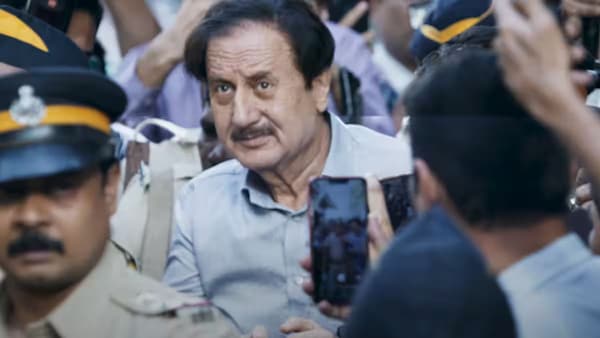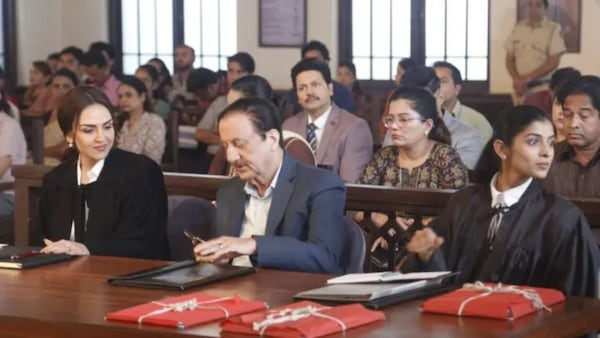Tumko Meri Kasam Is A Sappy Courtroom Drama
Vikram Bhatt's Tumko Meri Kasam is a vanity vehicle. This is not an anomaly but given the rut Hindi cinema is in, the existence of such a film only reinforces the pliability of the industry.

Promo poster for Tumko Meri Kasam.
Last Updated: 12.56 PM, Mar 22, 2025
SECOND TIME WITHIN MONTHS there is an Aurangzeb reference in a Hindi film. If the Mughal ruler was vilified in Laxman Utekar’s Chhaava then he is freshly referenced in Vikram Bhatt’s Tumko Meri Kasam. A character wickedly says he can do anything to sit in the seat of power, like Aurangzeb. But neither the man saying it is particularly odious nor is the outcome of the mention a disaster. One can argue about the overall ineffectiveness of Bhatt’s new work, but, in reality, Tumko Meri Kasam harks back to the good old time in Hindi cinema when films were made without agenda and motives, and scenes were allowed to breathe and not spliced together by furtive video-game editing.
Well, one part of this is more true than the other. Scenes go on unendingly in Tumko Meri Kasam (endearing at first and grating soon after) as the narrative veers towards propaganda. Except, Bhatt’s film props up a man and not a nation. But given that it props at least something up, Anupam Kher features in a central role and does everything. He stands in court as the accused; he argues as his own lawyer and doubles up as a detective to find loopholes in the case even as police officers remain conspicuously absent like what we are watching is a figment of someone’s imagination.

Well, this also might be true. Tumko Meri Kasam centres on the life and times of Dr Ajay Murdia, the fertility specialist who founded the nationwide India IVF chain. He is famed to popularise the concept and dispel stereotypes about it. Kher plays Murdia as the film straddles timelines (Ishwak Singh plays the younger version) and tells the latter’s origin story from his humble beginnings as a teacher to a later flourishing career as a businessman. But here’s the thing: Tumko Meri Kasam has been produced by Murdia’s Indira Entertainment, it features him as the protagonist and embellishes his life with harder tragedies only to highlight his greatness.

Tumko Meri Kasam opens with Ajay Murdia (Kher) in jail. He has been accused of attempting to kill a fellow board member. The man in question wants him removed as the chairperson of Indira IVF. The matter is brought to court as, what starts out to be a thriller, soon devolves into a sappy drama that takes every present exigency in Murdia’s life and uses that to flit back to his past marriage (his wife’s name is Indira, played by Adah Sharma).
The premise, of course, is a facade. Every frame of Tumko Meri Kasam exists to elevate the legacy and persona of Ajay Murdia. In the film, everyone near him is great. His sons are beyond reproach, his grandson helps see something in the case that he missed out on, his lawyer (played by Esha Deol) valorises him, the people he has worked with compare him to Ram, his wife is blindly devoted to him even when he remains blithely unaware of her health issues till she is diagnosed with stomach cancer.

By all definitions, Tumko Meri Kasam is a vanity vehicle. This is not an anomaly but given the rut Hindi cinema is in, the existence of such a film only reinforces the pliability of the industry. But it is disappointing that Bhatt, an inventive if not the most original filmmaker, has helmed this. There is one scene when Adah Sharma (who acted in Bhatt's 1920 ) talks to a woman but the latter’s face remains hidden. The staging of the moment is reminiscent of the many horror films Bhatt has made in the past. But then the woman turns her face with tears in her eyes. The intrigue deflates and we are left mirroring her emotion.

 Premium
Premium